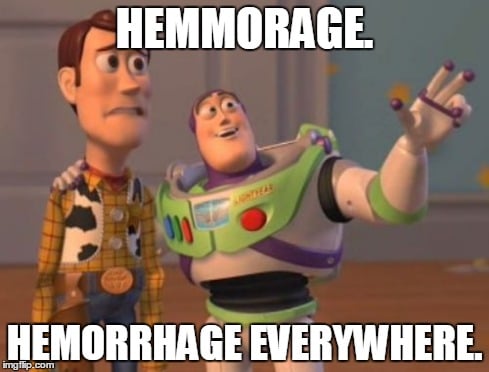Guys, let me give you some advice for your third year. First, do not disrespect the interns. We see this all the time, the interns ask the med students to help them with something and they either question the order with the upper level or flat out ignore it. Your job as a med student is to learn how to function as an intern. Unfortunately med students have this arrogant tendency to regard most of what interns do as scut. Interns are the workhorses of the team. Yes, the higher level decisions occur at the attending and resident level, but the interns make everything happen. It's irritating when med students want to participate in the discussion with the attending, but don't want to lift a finger to make things happen. This is not scut, this is patient care. This is learning how to function on a medical team and communicate with other providers. We had a group of med students recently whose apparent only interest was trying to impress the attending on rounds. Any mistakes that happened were blamed on the intern during the med students' presentation "I don't have any labs to report because somebody didn't order them." Here's a free piece of advice, NEVER call out a resident or intern in front of the attending to try and make yourself look better. We all cringe when this happens. After rounds, their goal was to get out of the hospital asap. At first they would say something along the lines of "is there anything else I can help you with" around 2 pm after helping the team with nothing. When we asked them to do something, they would either sigh and do a half assed job at what we asked or just not do it. eventually they started saying "I finished my work, I'll see you tomorrow" OK, we notice this.
You can complain all you want about your notes "not mattering," but they do. This is not "work." Work is what the interns and residents do. You are here to LEARN. To learn how to write notes, to learn how to run the list and take care of daily tasks. You are learning to be an intern. When we provide you with feedback on your notes,do not make excuses. We notice when you don't write notes, we notice when you do a crappy job on them because you think they don't matter, we notice when you copy and paste portions or even all of our notes (yes I had a med student that just copied and pasted my entire note). We notice when you avoid picking up new patients, we notice when you only want to to carry the patients who are dispso issues without active medical problems, we notice when you try to leave early. We notice when you dont do a single H&P the entire block. How can you learn to be an intern if you actively avoid everything they do? You even avoid enrichment activites we try to provide for you. If you are asked if you want to see an operation on one of your patients who is going to the OR today, don't say "maybe, if I can finish my notes beforehand" then try to leave early before it even starts.
Guys, it is really so easy to get a good evaluation from your residents and interns. All you have to do is show up, have a good attitude, be enthusiatic, act like you care about you patients, and always be ready and willing to do anything that's asked. THAT'S IT! I don't give two $$×&#$ whether or not you can get the attending's pimp questions right on rounds. You can answer virtually everything wrong, but if you actually try hard, you will get a good evaluation. Remember, the interns and residents write your evaluations too, and their comments can be used verbatim in your dean's letter.

